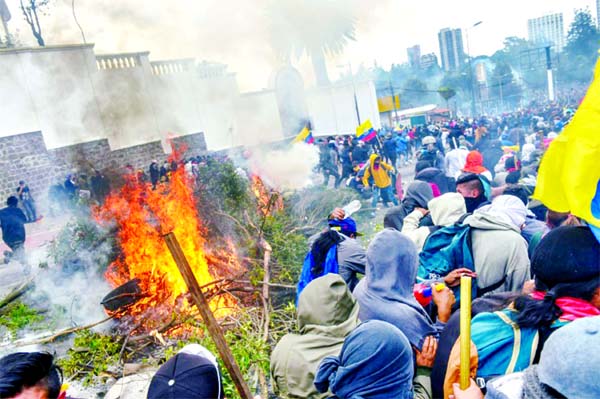
Ecuador’s capital braced for mass protests Wednesday despite talks between the government and indigenous leaders, as anger flared anew over a fuel price hike.
Unions and other groups angry at the price rise are expected in the streets of Quito alongside thousands of farmers and indigenous people.
They are demanding that President Lenin Moreno reinstate fuel subsidies that were rescinded after $4.2 billion in loans were agreed from the International Monetary Fund.
“We have already got in touch and have spoken with some of their leaders,” said Moreno on Tuesday as he greeted soldiers in the coastal city of Guayaquil, where he moved government headquarters last week.
There was “some difficulty” though, he admitted as more than sixty organizations were against the fuel price hike.
On Tuesday, clashes between security forces and protesters broke out near Congress and demonstrators-many of them indigenous men armed with sticks and whips-surged through a security cordon and into the building.
They rushed into the meeting room and occupied the podium, but were soon evicted by security forces.
“Today the Assembly and later we’ll take Carondelet,” said one protester, referring to the presidential palace in the capital.
AFP journalists saw young people trying to break through security barriers, holding wooden shields with the words “indigenous guard” painted on them.
Moreno subsequently ordered an overnight curfew to protect public buildings. He declared a state of emergency over the nationwide protests last week.
The demonstrations broke out after increases of up to 120 percent in fuel prices came into force on October 3.
They have so far left one civilian dead and 77 people injured, the majority of them security forces, the government said. A total of 477 people have been detained.
Discussions with leaders of the powerful indigenous umbrella organization CONAIE took place in Guayaquil, some 170 miles (270 kilometres) southwest of the capital.
“There is dialogue with the brother indigenous peoples who unfortunately have needs”, Moreno said.
He also offered to free up resources for those hit hard by the rise in fuel prices.
Several days of protests against the fuel price hike have slashed the South American country’s oil output by a third, according to the Energy Ministry.
Production losses at the state-owned Petroamazonas “will reach 165,000 barrels per day,” the ministry said in a statement. Ecuador, which exited the OPEC international oil cartel last week citing economic constraints, normally produces 531,000 barrels per day.
Moreno had accused his predecessor and ex-ally Rafael Correa along with Venezuelan President Nicolas Maduro of an “attempted coup d’etat.”
He said they were using “indigenous groups, taking advantage of their mobilization to plunder and destroy”, accusations Maduro dismissed as absurd.
Moreno has drawn support however from seven Latin American countries that, in a joint statement rejected any effort by Maduro and his allies to “destabilize” Ecuador.
All seven-which include Argentina, Brazil and Columbia-have right-wing governments that see Moreno’s moderate socialist administration as an important regional ally against Venezuela.
Correa meanwhile called for early elections, citing “serious social upheaval,” while denying he was attempting to oust Moreno.
“There’s no coup here. Conflicts in democracy are resolved at the polls,” the Belgium-based Correa said in a video published on social media.
Moreno scrapped fuel subsidies as part of an agreement with the International Monetary Fund to obtain loans despite Ecuador’s high public debt.
The subsidies were costing the government $1.3 billion a year.
The IMF agreement, signed in March, allowed Ecuador to borrow $4.2 billion.

